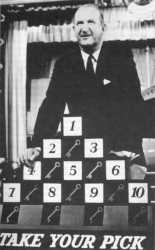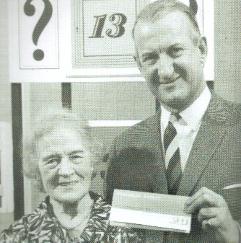Take Your Pick
Contents |
Host
Michael Miles (original host)
90s version: Des O'Connor
Co-hosts
Original announcer: Bob Danvers-Walker
Organist: Harold Smart
Original "gonger": Alec Dane
1990s version hostesses:
Jodie Wilson (1992-4?),
Gillian and Gail Blakeney - twins from the Australian soap opera Neighbours (1995),
Sarah Matravers (1996),
Sasha Lawrence (1997),
Debbie Flett (1998)
1990s announcers:
John Sachs
Steve Jones
Broadcast
Arlington Television & Radio Ltd for Associated-Rediffusion, 23 September 1955-1968
Thames for ITV, 1992-8
Co-produced by Central, 1993-8
TalkbackThames for ITV, 2005 (Gameshow Marathon one-off)
Synopsis
Recent viewers of the Des O'Connor of this show will find that it is very similar to the original show hosted by Michael Miles - the "quiz inquizitor" - in 1955.
First, there was the infamous "Yes-No Interlude" - a qualification game lasting up to 60 seconds where the contestants had to respond to the questionmaster's interview questions without saying those two little words, or nodding or shaking the head. Often there'd be at least one contestant on each show who would be eliminated like this:
(Contestant enters with hostess)
Hostess: "This is Maureen from Darlington."
Presenter: "Maureen, nice to meet you. Are you well?"
Contestant: "Yes"
BONG!
Successful contestants were then brought on one-at-a-time and were asked three simple general knowledge questions. If they get them right, they get to pick a key from ten available, each key opening a corresponding box.
 Michael Miles with his boxes
Michael Miles with his boxesHowever, the host would try to buy back the key using increasing amounts of money until either the contestant gave in or the host refused to offer any more money. The boxes contained three booby prizes, one key to a treasure chest, and the rest were good prizes including a star prize.
There was also Box 13. If the contestant picked one of the boxes, the host tried to buy two keys off them - the key they picked and the key for Box 13. If the contestant decided to refuse the money and keep the keys, they had to pick which key to go with as they only got to keep one prize. The object in Box 13 would be a clue to what the mystery prize was. The host knew what the prize in Box 13 was, but he didn't know what was in the other boxes. The contents of Box 13 could be a booby prize, but by and large (in the 90s version, anyway) it was nearly always a holiday.
Along with Hughie Green's Double Your Money, TYP was one of the most successful quiz shows of the era, and like DYM, it only came to an end in 1968 because Associated-Rediffusion lost their franchise. It was also the first British game show to give away a cash prize.
In the earlier series of Michael Miles original version, the show had a first round - "forfeits". Each contestant had to complete one of these before going on to the Yes/No Interlude.
Catchphrases
"There's the keys, take your pick"
"Take the money/Open the box"
Theme music
1990s version: Des O'Connor himself, arranged by Ray Monk.
Inventor
Devised by Michael Miles, developed from his Radio Luxembourg show.
Trivia
In the original 1955 show, a successful contestant in the Yes-No game earned a prize of five shillings (25 pence in modern money).
TYP was the first Friday night game show on ITV. In the London area, it drew a 78% audience share, and one 1959 episode became the second highest rated programme of the 1950s, drawing in 13.15 million viewers (only beaten by a episode of 'Wagon Train' in the same year, which had 13.62 million).
The "head gonger" who gonged people out in the Yes-No game was Alec Dane, a singer and actor who became an institution in the 1960s.
A lady named Emily Ayerst (picture below) failed to win a Trip Of A Lifetime to see her son in Australia - but hundreds of viewers were so touched by her story that they sent in donations and she got to go after all. Eee, 'twere a different world in them days.
Contary to widespread belief, Take Your Pick was only showing in some ITV regions when ITN interrupted the programme for a Newsflash came through about President Kennedy's assassination - although they did not say he had died at that time, just shot. Granada, who were not showing TYP, were the first to break the news whilst Scene at 6:30 (the regional news programme at the time) was on air.


